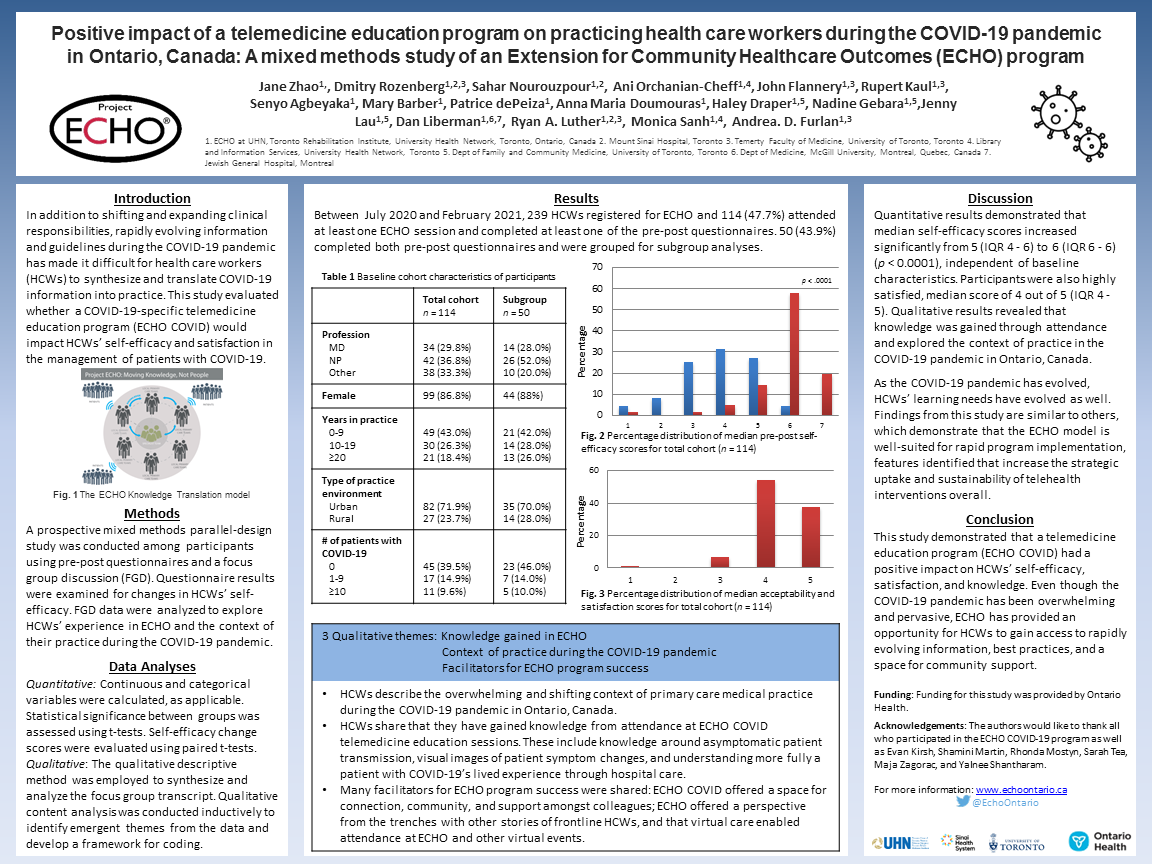SRFP103: The positive impact of a telemedicine education program on healthcare workers during the COVID-19 pandemic in Ontario, Canada
Jane Zhao, MSc; Dmitry Rozenberg, MD, PhD; Sahar Nourouzpour; Ani Orchanian-Cheff; Rupert Kaul, MD, PhD; Senyo Agbeyaka, MSW; Patrice de Peiza; Nadine Gebara; Ryan Luther, MD, MSc; Monica Sanh; Anna Maria Doumouras; haley draper; Mary Barber, MSc, OT; Jenny Lau, MD; Andrea Furlan
Abstract
The impact of the COVID-19 pandemic on health care service and delivery has been profound. In addition to shifting and expanding clinical responsibilities, rapidly evolving information and guidelines during the COVID-19 pandemic has made it difficult for healthcare workers (HCWs) to synthesize and translate COVID-19 information into practice.
Objective
The objectives of this study are 1) to examine the impact of a telemedicine education program on HCW’s self-efficacy and satisfaction and 2) to explore HCWs’ experience in the program and context of practice during the COVID-19 pandemic.
Study Design
We conducted a prospective mixed methods parallel-design study among ECHO COVID participants using pre-post questionnaires and focus group discussions (FGDs). We examined questionnaire results for changes in HCWs’ self-efficacy and satisfaction. We analyzed FGD data to explore HCWs’ experience in ECHO and the context of their practice during the COVID-19 pandemic.
Setting
Project Extension for Community Healthcare Outcomes (ECHO) model is a virtual, telemedicine education model that provides longitudinal support and addresses the emerging needs of HCWs. “ECHO Ontario: Managing COVID-19 Patients in the Community” (ECHO) was launched in July 2020. The goal of the program was to disseminate best practices regarding COVID-19 as they emerged and to increase HCW confidence and knowledge of COVID-19.
Population Studied
The study population were practicing HCWs in the province of Ontario, Canada.
Outcome Measures
1) HCW self-efficacy
2) HCW satisfaction
Results
Of 299 HCWs registered in ECHO COVID, 114 (38.1%) participated in this analysis. Median self-efficacy scores increased from 5 (IQR 4 - 6) to 6 (IQR 6 - 6) (p < 0.0001), independent of profession, years in practice, age group, or type of practice environment. Participants were highly satisfied with the ECHO sessions with a median score of 4 (IQR 4 - 5). FGD data indicated that HCWs gained knowledge through ECHO, established the context of their practice, and revealed facilitators for ECHO program success, including the transition to virtual care, the practicability of knowledge provided, and a “perspective from the trenches.”
Conclusions
This study demonstrated that a telemedicine education program aimed to support HCWs in managing patients with COVID-19 had a positive impact on self-efficacy and satisfaction, and that this impact was specifically mediated through the ECHO program.

Jack Westfall
jwestfall@aafp.org 11/21/2021Great poster and abstract. Thanks for sharing at NAPCRG